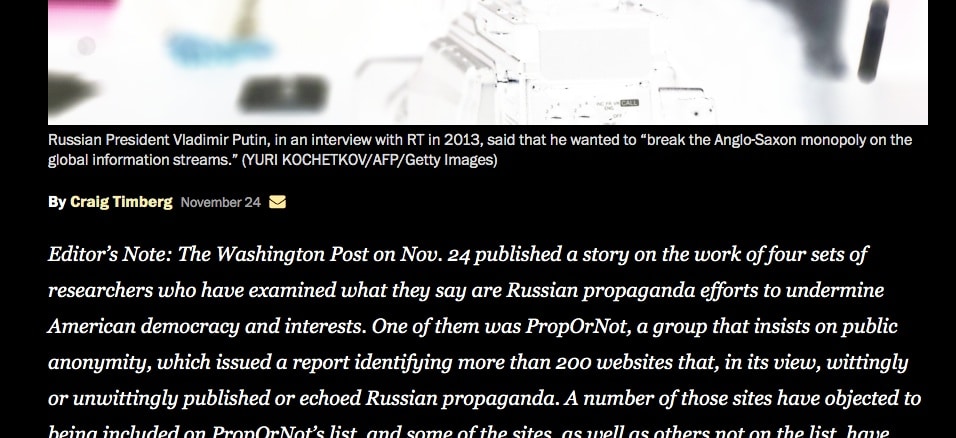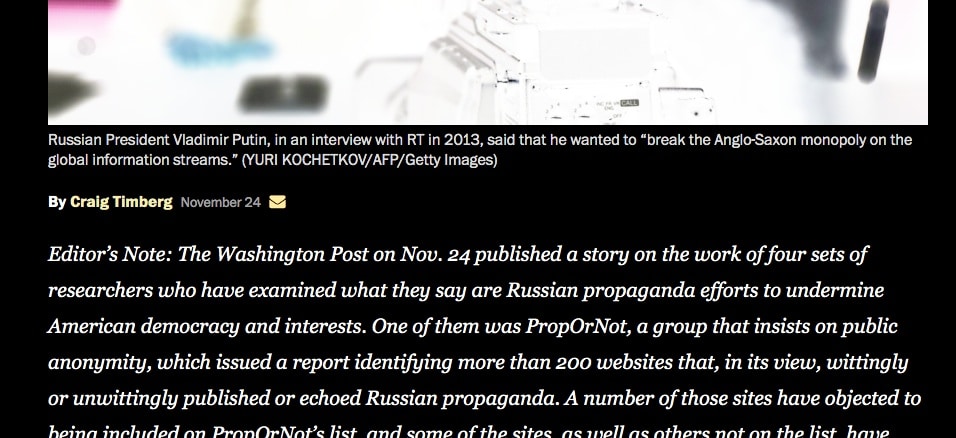The Washington Post has been under fire for its publication of an article entitled, “Russian propaganda effort helped spread ‘fake news’ during election, experts say.” The article by Craig Timberg relied on a controversial website called PropOrNot, which published what is little more than a black list of website that the authors deemed purveyors of fake news including some of the largest sites on the Internet like Drudge Report. However, the previously unknown group was itself criticized for listing “allies” that proved false. Yesterday, Hillary Clinton ramped up the call for action against “fake news” which she described as an epidemic. Now the Washington Post has published a rather cryptic correction to the fake news story. The controversy is the subject of my latest column in USA Today.
The organization listed a variety of news sites as illegitimate. It included some of the most popular political sites from the left and right Truthout, Zero Hedge, Antiwar.com, and the Ron Paul Institute. It even includes one of the most read sites on the Internet, the Drudge Report. Notably, it also included WikiLeaks, which has been credited with exposing political corruption and unlawful surveillance programs.
The Washington Post is the largest newspaper to buy the clearly biased list as the work of objective “experts” — ignoring that the site relies on anonymity of those contributors. When the Post ran the story, some were eager to push the story as a reason why they lost the election. The former White House adviser Dan Pfeiffer tweeted, “Why isn’t this the biggest story in the world right now?” The reason is that it was facially absurd.
The Post has now added the following “correction”:
Editor’s Note: The Washington Post on Nov. 24 published a story on the work of four sets of researchers who have examined what they say are Russian propaganda efforts to undermine American democracy and interests. One of them was PropOrNot, a group that insists on public anonymity, which issued a report identifying more than 200 websites that, in its view, wittingly or unwittingly published or echoed Russian propaganda. A number of those sites have objected to being included on PropOrNot’s list, and some of the sites, as well as others not on the list, have publicly challenged the group’s methodology and conclusions. The Post, which did not name any of the sites, does not itself vouch for the validity of PropOrNot’s findings regarding any individual media outlet, nor did the article purport to do so. Since publication of The Post’s story, PropOrNot has removed some sites from its list.
One of the spins offered by the Clinton camp was that the election loss was not (1) the establishment engineering the primary win for Clinton; (2) the selection of the ultimate establishment figure when all polls showed people wanted an outsider; (3) the record low polls of Clinton for popularity and honesty; or (4) the continual missteps of Clinton or her staff in just being honest in dealing with various scandals. Instead it was the “fake news” problem. When this has been raised during speech appearances in the last few weeks, I have repeatedly asked people to point to the fake news that influenced the election. They often cite the FBI investigation but that is not fake news. It was real news. They also cite Wikileaks. However, while Clinton and DNC head Donna Brazile suggested that emails were tampered with, they produced no proof of any such false emails on Wikileaks.
When the New Yorker pressed the anonymous spokesman (a curious position) for ProporNot, he struggled to explain why conservative sites like Drudge were put on the list.
Yet, when pressed on the technical patterns that led PropOrNot to label the Drudge Report a Russian propaganda outlet, he could point only to a general perception of bias in its content. “They act as a repeater to a significant extent, in that they refer audiences to sort of Russian stuff,” he said. “There’s no a-priori reason, stepping back, that a conservative news site would rely on so many Russian news sources. What is up with that?”
Now there is hard journalistic work. The Post insists that it had other sources, but what would prompt the reliance on this anonymous band of obvious amateurs?
I have been highly critical of sites like The National Report, a group of truly juvenile idiots who get a thrill by just placing false news stories. Those sites are the Internet version of graffiti and should be addressed by servers. I have also encouraged lawsuit for defamation and false light when available. However, there are thankfully few adults who actually get a kick out of tricking people into posting false stories. They are the same type of people who love to watch fire departments rush to false alarms. It gives some weird sense of worth to degrade others by tricking them.
The current controversy is different. Many people in Washington are irate over Wikileaks — not because the emails were untrue but because they proved what many had long suspected . . . that Washington is a highly corrupt place full of truly despicable people. For people who make their living on controlling media and information, it was akin to the barbarians breaching the walls of Rome. So the answer is to call for government regulation to combat what will be declared “fake” news or propaganda. It is only the latest effort to convince people to surrender their rights and actually embrace censorship.
Reprinted with permission from JonathanTurley.org.


